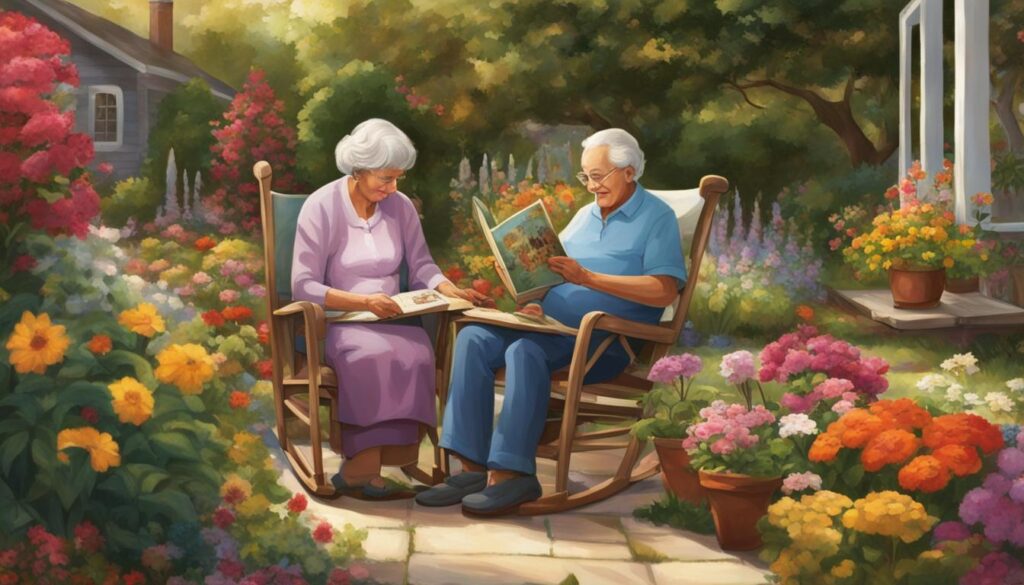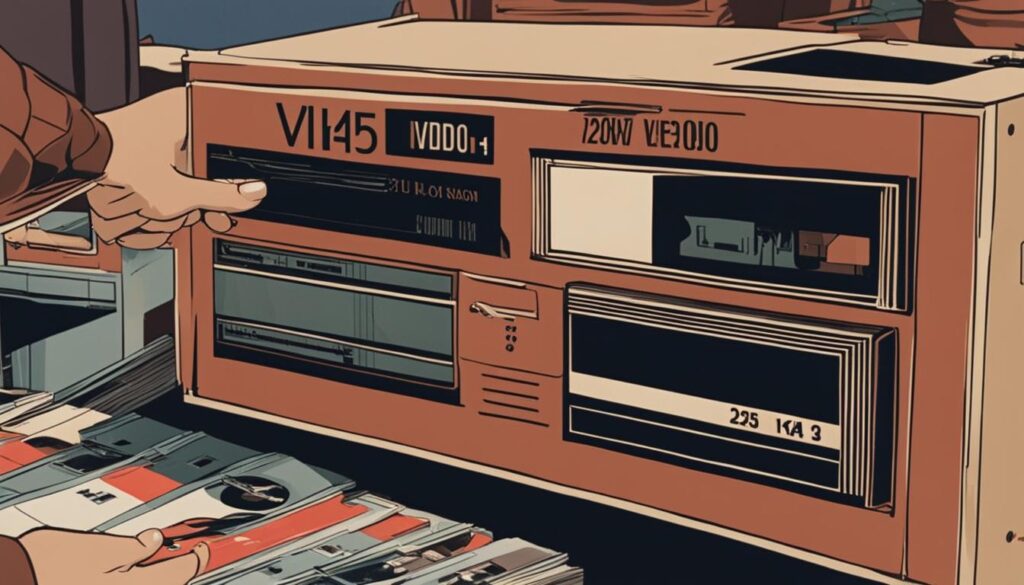In our golden years, preserving memories becomes even more important as we reflect on the lives we’ve lived and the legacy we want to leave behind. Memory preservation at 70 goes beyond simply reminiscing; it’s about creating a lasting impact for future generations. Whether it’s through reminiscence therapy, family-based activities, or legacy projects, there are countless ways to ensure that our memories and stories continue to be cherished.
Key Takeaways:
- Preserving memories in your 70s is an opportunity to create a lasting legacy.
- Reminiscence therapy and family-based activities can improve communication and reduce caregiving stress.
- Legacy projects, such as scrapbooks and audiotaped stories, foster emotional connections.
- Celebrating special occasions like Grandparents Day can be a meaningful way to honor family history.
- Home video archiving plays a crucial role in preserving family legacy for future generations.
Celebrating Grandparents Day and Family History
Grandparents have a wealth of wisdom and cherished memories to share, making Grandparents Day the perfect occasion to celebrate their role in our lives. This special holiday, established in 1978, provides an opportunity to honor grandparents and strengthen intergenerational connections within the family. It’s a time to reflect on the importance of family history, childhood memories, and the unique family traditions that have shaped our lives.
To make Grandparents Day truly memorable, consider engaging in activities that preserve family history and create lasting memories. Interviewing grandparents and capturing their stories, looking through old family photos, researching your family’s heritage online, and organizing a family history scrapbook are meaningful ways to celebrate the day. These activities not only help you learn more about your family’s past but also provide an opportunity to bond with your grandparents and create new memories together.
“Family history is not just about the past; it shapes our present and future. It’s a tapestry of stories, traditions, and values that connect generations and foster a sense of belonging,” says Dr. Jane Watson, a renowned family historian and author.
Another way to celebrate Grandparents Day is by visiting your grandparents’ hometowns or ancestral lands. Exploring the places that hold significance in your family history can deepen your understanding of your roots and provide a profound sense of connection. Sharing your family history discoveries with your loved ones can also create a sense of pride and unity within the family.

Grandparents Day Activities:
- Interviewing grandparents and recording their stories
- Browsing through old family photos and discussing the memories they evoke
- Researching family history online and sharing interesting findings with the family
- Creating a family history scrapbook or photo album
- Visiting grandparents’ hometowns or ancestral lands and exploring family roots
By celebrating Grandparents Day and embracing family history, we not only honor the past but also strengthen the bonds that tie us together. The memories and traditions we preserve today become the legacy we leave behind for future generations, creating a sense of continuity and connection that lasts a lifetime.
The Importance of Home Video Archiving
Home videos play a vital role in preserving family legacy by capturing not only events but also emotions and nuances that other forms of documentation cannot. Archiving home videos ensures that these memories are preserved and accessible for future generations. Home video archiving can also have therapeutic effects, providing comfort, nostalgia, and promoting bonding within families.
Visual and auditory recordings have a unique power to evoke emotions and create lasting connections with our loved ones. Unlike photographs or written accounts, home videos capture the essence of a moment in time, allowing us to relive our cherished memories. From birthdays and holidays to everyday moments and milestones, these videos hold the key to preserving the rich tapestry of our family history.
By archiving home videos, we are not only preserving the past but also creating a lasting legacy for future generations. Our children, grandchildren, and beyond will have the opportunity to witness the joy, laughter, and love that filled our lives. These videos serve as a bridge between the past and the present, connecting us to our roots and fostering a sense of identity and belonging.

Whether it’s a wedding, a family vacation, or a simple moment captured at home, each video carries a piece of our family story. By archiving these videos, we ensure that they are protected from the passage of time and technological advances. As formats change and devices become obsolete, the risk of losing these precious memories grows. Home video archiving safeguards against this loss and ensures that our family legacy remains intact.
Archiving Home Videos: A Step-by-Step Guide
Preserving precious home videos allows us to relive cherished memories and pass them down to future generations. If you’re looking to archive your collection of home videos, we’ve got you covered. In this section, we’ll walk you through the process of archiving home videos, from organizing and cleaning to repairing and digitizing.
Organizing
Before you begin archiving your home videos, it’s essential to organize them. Start by labeling each video with dates, events, and the people involved. This helps prioritize which videos to archive first and makes it easier to locate specific memories in the future. You can create a simple spreadsheet or use video organization software to keep track of your collection.
Cleaning and Repairing
Physical damage can deteriorate the quality of your home videos over time, so it’s crucial to clean and repair them before archiving. Gently remove any dust or dirt from the tapes using a soft cloth or a tape cleaning solution. If you notice any physical damage, such as torn or brittle tapes, consider seeking professional assistance for repairs. Proper cleaning and repairing ensure that your videos are preserved in the best possible condition.
Digitization
Digitizing your home videos is the final step in the archiving process. There are two main methods you can choose from: DIY or professional services. For a DIY approach, you can use a digitizer or a video player that connects to your computer to transfer the videos. Alternatively, you can opt for professional home movie archiving services that offer high-quality digitization and additional enhancements like color correction and noise reduction.

By following these steps, you can successfully archive your home videos and ensure that your cherished memories are preserved for years to come. Whether you choose the DIY route or opt for professional services, the outcome will be a collection of digitized videos that can be easily accessed, shared, and enjoyed by your family and future generations.
DIY Home Video Archiving Tips and Tools
Preserving cherished family memories through home video archiving is a rewarding endeavor that allows you to digitize and safeguard precious moments for future generations. With the right tools and techniques, you can successfully undertake the DIY home video archiving process. Here are some tips and tools to help you get started:
Assessing the Format
Before you begin digitizing your home videos, it’s important to assess the format they are in. Different formats require different equipment and methods for digitization. Whether you have VHS tapes, Super 8 films, or Hi8 tapes, research the appropriate digitizers or converters that are compatible with your specific format.
Connecting Analog Sources
For digitizing analog home videos, you’ll need to connect your analog sources, such as VCRs or camcorders, to the digitizer device. This may involve using RCA or S-video cables to establish a connection. Follow the manufacturer’s instructions for properly connecting the devices and ensure that you have the necessary cables and adapters.
Utilizing Video Editing Software
Once your home videos are digitized, you can enhance them and make them more organized using video editing software. There are various free and paid software options available that allow you to trim footage, add titles, adjust colors, and even remove unwanted noise or imperfections. Explore different software options to find the one that suits your needs and level of expertise.
Proper Storage and Organization
After digitizing and editing your home videos, it’s crucial to store them properly to ensure their longevity. Invest in reliable storage solutions such as external hard drives or cloud storage services. Label your videos with descriptive titles and organize them in folders by date, event, or family member to make them easily accessible.
By following these DIY home video archiving tips and utilizing the right tools, you can preserve your family’s memories for years to come. Take the time to digitize and organize your home videos, and create a treasure trove of cherished moments that can be passed down through generations.
Professional Home Movie Archiving Services
In today’s digital age, preserving and digitizing home videos has become increasingly important. While DIY methods for archiving home videos are popular, some individuals may prefer a more hands-off approach or have a large collection of videos that require professional attention. That’s where professional home movie archiving services come in. These services offer comprehensive solutions for cleaning, repairing, digitizing, and enhancing your precious family memories.
One of the key advantages of professional archiving services is their expertise in handling delicate and aged film materials. They have the knowledge, equipment, and techniques necessary to carefully clean and repair any physical damage that may have occurred over time. By entrusting your home videos to professionals, you can ensure that they are preserved in the best possible condition.
“Professional home movie archiving services offer comprehensive solutions for preserving and enhancing home videos.”
Digitization is another essential service provided by professionals. They utilize high-end equipment to convert your analog videos into a digital format, ensuring that they can be easily viewed and shared on modern devices. Additionally, professional archiving services often offer enhancements such as color correction, noise reduction, and stabilization, further improving the quality of your videos.
| Services | Benefits |
|---|---|
| Cleaning and repair | – Extends the lifespan of videos – Restores damaged footage |
| Digitization | – Easy viewing and sharing on modern devices – Preserves videos for future generations |
| Enhancements | – Improves video quality – Enhances watching experience |
Professional home movie archiving services offer a convenient and reliable solution for preserving your family’s legacy. Whether you have a few cherished videos or an extensive collection, these services can ensure that your memories are protected and accessible for generations to come. Consider reaching out to a professional archiving service to safeguard your precious home videos and enhance their quality.
Conclusion
Preserving memories and creating legacies in your 70s is an invaluable endeavor that fosters emotional connections and strengthens family bonds. By celebrating Grandparents Day, engaging in home video archiving, and delving into family history, you can ensure that cherished memories are safeguarded and passed down to future generations. Additionally, sharing stories and experiences with younger family members not only enriches their understanding of the family’s history but also creates lasting relationships that transcend generations. Moreover, adapting to new tech in retirement can enhance this process, enabling seniors to use digital platforms to document their legacies in creative and accessible ways. Embracing these tools can empower them to connect with family, no matter the distance, making the preservation of memories more dynamic and engaging.
Memory preservation is a key aspect of creating a lasting family legacy. Through activities such as reminiscence therapy, life review, and legacy projects, you can enhance emotional connections and increase positive emotions as you approach the later stages of life.
Home video archiving is another essential component of preserving memories. By organizing, cleaning, repairing, and digitizing your home videos, you can ensure they remain accessible and protected for years to come. Whether you choose DIY methods or professional services, archiving your videos will provide comfort and inspiration, allowing you to relive cherished moments and share them with your loved ones.
In conclusion, preserving memories and creating a family legacy through activities like celebrating Grandparents Day, engaging in home video archiving, and researching family history is a meaningful endeavor. By embracing these practices, you can uphold the importance of memory preservation, strengthen family connections, and leave a lasting impact on future generations.
How Can Preserving Memories and Creating Legacies Help in Managing Legal Affairs and Documentation in Your 70s?
Preserving memories and creating legacies play a crucial role in legal affairs management in your 70s. By documenting important information, such as wills, trusts, and healthcare directives, you ensure that your intentions are clearly stated. Additionally, preserving memories through photographs, journals, or recordings can provide valuable insights for future descendants, assisting them in understanding family history and assets. These proactive measures help streamline legal processes and provide a solid foundation for managing your legal affairs effectively.
FAQ
What are some meaningful ways to celebrate Grandparents Day?
Some meaningful ways to celebrate Grandparents Day include interviewing grandparents, looking through old family photos, researching heritage online, and organizing a family history scrapbook. Visiting grandparents’ hometowns and sharing family history discoveries with the family can also deepen the understanding of family roots and create lasting memories.
How do home videos play a role in preserving family legacy?
Home videos capture not only events but also emotions and nuances that other forms of documentation cannot. Archiving home videos ensures that these memories are preserved and accessible for future generations. Home video archiving can also have therapeutic effects, providing comfort, nostalgia, and promoting bonding within families.
What is the process of archiving home videos?
The process of archiving home videos involves organizing the videos, cleaning and repairing any physical damage, and digitizing the videos into a digital format. Organizing the videos includes labeling them with dates, events, and people involved to prioritize which ones to archive first. Cleaning and repairing physical damage are crucial to prevent further deterioration. Digitizing the videos can be done through DIY methods using digitizers and video players or by hiring professional home movie archiving services.
What are some DIY tips for home video archiving?
DIY home video archiving involves assessing the format of the home videos, connecting analog sources to digitizers, and utilizing video editing software. Proper storage systems, such as external hard drives or cloud storage, are also necessary to preserve and organize the digital files. Tips include labeling videos, handling them with care, and being patient throughout the process.
What do professional home movie archiving services offer?
Professional home movie archiving services offer comprehensive solutions for preserving and enhancing home videos. These services handle tasks such as cleaning, repairing, and digitizing the videos using high-end equipment. They also provide enhancement features like color correction, noise reduction, and stabilization. Professional archiving services are ideal for those who prefer a hands-off approach or have a large collection of home videos.
How Can I Preserve My Historical Legacy and Stories in My 70s?
Preserving historical stories in your 70s can be a fulfilling endeavor worth pursuing. Start by organizing your memories, documents, and photographs to create a coherent narrative. Consider digitizing these materials to ensure their longevity. Engage with younger generations through storytelling or recording your experiences. Join local historical societies or attend workshops to learn preservation techniques. Your efforts can guarantee that your valuable legacy remains alive for future generations.

